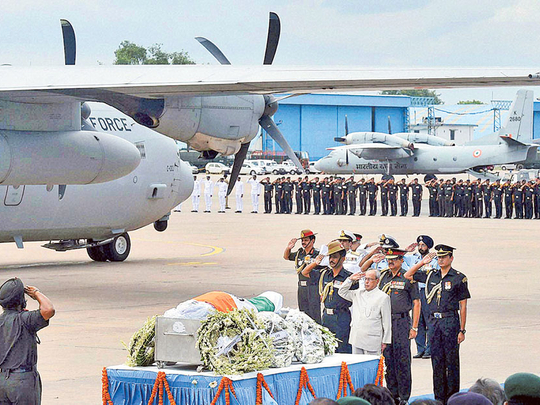
New Delhi: People’s President, Missile Man, Rocket Scientist, Bharat Ratna, eminent scholar, great visionary — these are just some of the titles that come before the name of APJ Abdul Kalam who died on Monday, collapsing in the middle of a lecture at Indian Institute of Management (IIM) in Meghalaya.
The common man of India is in grief today. Even at the age of 83 years, the missile man was thinking about finding better solutions for the country’s energy requirements.
The only bachelor president of India was also disturbed over the frequent adjournments of Parliament and was planning to ask students for what they thought were possible solutions.
Srijan Pal Singh, who travelled with Abdul Kalam for the event at IIM-Shillong, said, “For the past two days, Dr [Abdul] Kalam was worried that time and again Parliament, the supreme institution of democracy, was dysfunctional.”
Hailing from a humble background, Abdul Kalam was indeed the “People’s President”.
The office of the President of India had assumed a new meaning in the hearts of billions of Indians from 2002 to 2007 — the Abdul Kalam years at the Rashtrapati Bhavan.
The humility and compassion that he showered on all irrespective of caste, colour or creed, made him “People’s President”.
A report said that once during an event, the former president refused to sit on a chair designated for him as it was bigger than the rest of the four chairs on stage meant for other officials.
The organisers soon made another chair available for Abdul Kalam. The former president did not like receiving preferential treatment.
He did the unthinkable by inviting a cobbler and a small hotel owner as ‘Presidential guests’ to the Raj Bhavan of Kerala. Then as a President, he showed that no occupation was small and that every common man was special.
Fifty-three-year-old Harry Sheridon who had been with Abdul Kalam as his personal secretary for the past 24 years, could not believe the former President was no more.
The secretary recalled that Abdul Kalam never had a television at home and would start his day at 7am and stay awake until 2am. He would listen to the radio, mostly news on All India Radio, and would personally check his emails on a daily basis.
His personal physician would visit him regularly, but he had not complained of any ailments.
His personal life story, starting from a poverty-ridden childhood, to a struggle to get education, and his contribution to India’s missile technology will remain a source of inspiration for the country. Abdul Kalam was as well-versed with the Quran as he was with the Bhagvad Gita — a secular Indian in the true sense.
After India’s first nuclear test carried out on May 18, 1974 in Rajasthan’s Pokhran, no nuclear tests took place until 1998, when then prime minister Atal Bihari Vajpayee and scientific adviser to Defence Minister Abdul Kalam decided that it was time for the country to announce its nuclear status with a huge bang.
Abdul Kalam was the brains behind the multiple nuclear tests carried at the Pokhran test range. From 1992 to 1999, Abdul Kalam led the weaponisation of strategic missile systems and the Pokhran-II nuclear tests in collaboration with Department of Atomic Energy, which made India a nuclear weapon state.
Abdul Kalam, who had supervised the Pokhran-II explosions as the chief of the Defence Research and Development Organisation, camping in the Thar desert for over a fortnight, had said the testing was a “defining moment” in the country’s history, next only to adopting the path of economic liberalisation in 1991.
On May 11 this year, Abdul Kalam had tweeted, “Today, I remember the hot day of 1998 at Pokhran: 53C. When most of the world was sleeping; India’s nuclear era emerged.”
Acknowledged as the driving force behind India’s quest for cutting-edge defence technologies, Abdul Kalam’s contributions to India’s satellite programmes, guided and ballistic missiles project, nuclear weapons programme and the Light Combat Aircraft (LCA) project made him a household name.
Indian space agency chief A.S. Krishna Kumar termed the sudden demise of Abdul Kalam a tremendous loss to the country.
“Dr [Abdul] Kalam contributed in development of rocket technology. We remember him as a person who is extremely knowledgeable,” Kumar said.
Celebrities and everyday-people alike thronged on Twitter to post messages as the hashtag #KalamSir soared to become India’s top trend.
“Let’s salute the pure soul who gave his life for us. Let’s tribute the strong mind, determined to do anything for us. Let’s show our joy, for his great heart,” read one tweet by Meenu Goyal.
“APJ Abdul Kalam Sir, u showed us lights, dreams and vision, coloured our thoughts. Your death has brought the curtains down on a rich legacy that saw a man born into a poor family notch up exalted sobriquets such as rocket scientist and missile man before occupying India’s highest office,” read another.
Bharat Ratna C.N.R. Rao believes Kalam’s simplicity was his greatest quality.
“It was like the bigger you get, the simpler you become. He wanted India to shine, everything he did in his life was for this — he wanted India to be very powerful. He even passed away while doing what he loved most — talking to children. God must have blessed him,” Rao said.
VOX POP
Nilesh Khalkho, CEO, Sharaf DG
I had the pleasure of working with him when he was heading India’s missile programme. He always took the time to talk to youngsters on the project, despite his high-profile post and busy schedule. Despite the odds we were facing, such as the then embargo on missile technology, he always kept our spirits high.
Vasanti Sundaram, Editorial Head — Arab Region, APCO
Worldwide I was given the privilege to interview Dr Abdul Kalam in October 2003, during his presidential visit to the UAE. I was face to face with a man
who ... had not an iota of ego, nor a shred of pretentiousness ... it was so easy to forget the office that he held, and connect with him.
Gundeep Singh, President and Founder, The Change Initiative
From what I remember, he was the epitome of humility and intelligence. He was the only person who created a defence platform for India and made it look non-threatening ... Dr Abdul Kalam was a pioneer who made India futuristic and self-reliant in the field of space exploration.
Sampath Dorairajan, General Manager (Ops), BPG Maxus
He was humility personified. It is this trait in him that endeared him to every
Indian ... His effortless ability to communicate with one and all and his inspiring spirit to motivate the youth touched several lives. He stood
indomitable as an individual who went on to achieve the highest position.
Ravi Menon, Dubai-based writer and commentator
Dr Abdul Kalam was a hawk-cum-pacifist; a Gandhi and a Dr Strangelove. I would consider him a weapons expert more than a scientist. He was the man who put an end to India’s traditional ambiguity on nuclear and missile capabilities. Yet at heart was as a peace-nick; a visionary who loved to ideate.
- By Faisal Masudi, Staff Reporter












